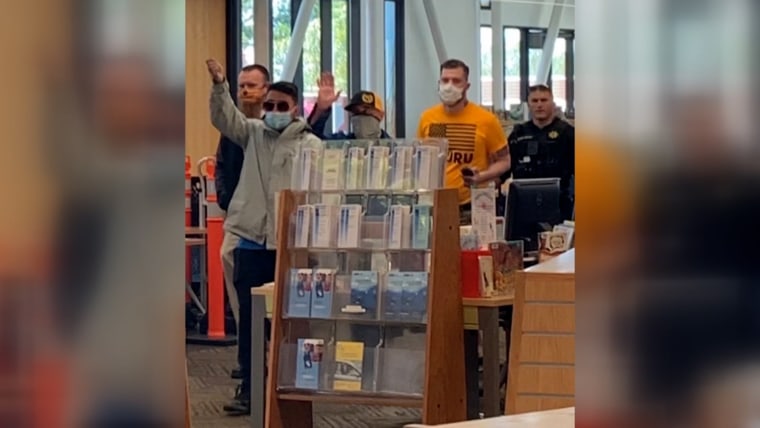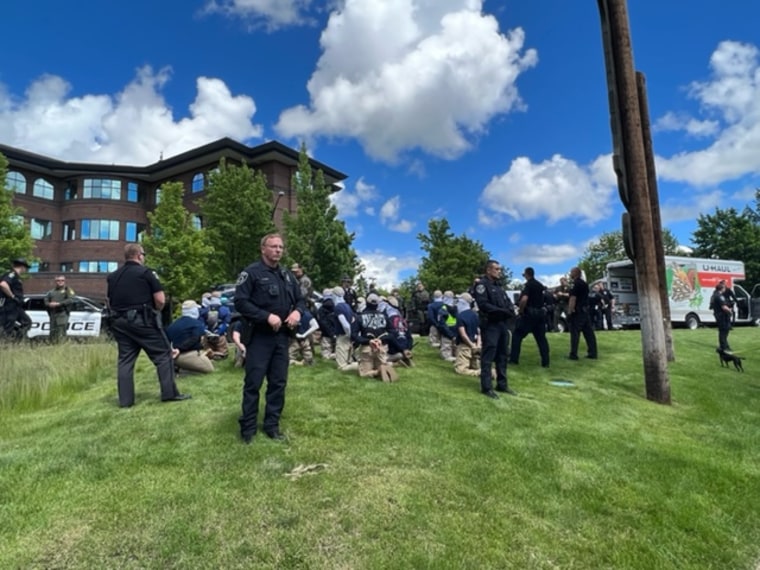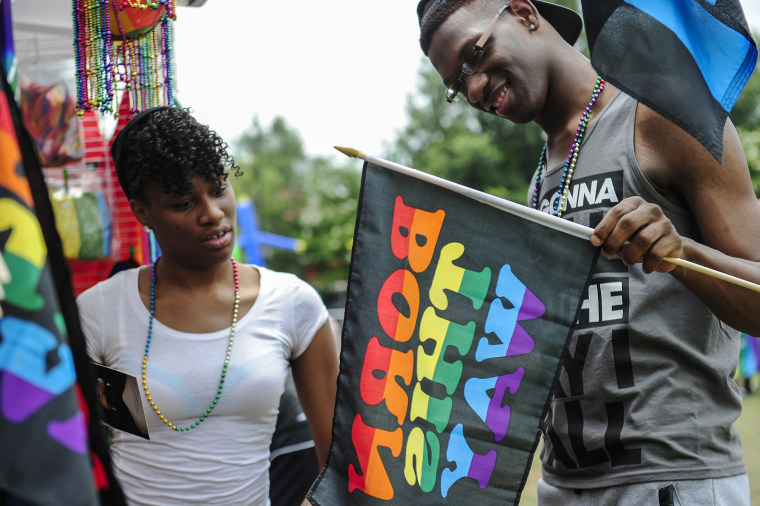How Pride organizers are responding to increased threats to LGBTQ events
At least three LGBTQ events were targeted by white nationalist groups last weekend, but organizers of Pride parades and festivals say they won’t give in to fear.
On Saturday, police arrested 31 people affiliated with the white nationalist group Patriot Front on suspicion of conspiracy to riot after they showed up near an annual “Pride in the Park” event in Coeur d’Alene, Idaho, with gas masks and shields, police said.
Then, on Sunday — the six-year anniversary of the shooting at Pulse, an LGBTQ nightclub in Orlando, Florida — five men whom witnesses described as members of the Proud Boys disrupted a “Drag Queen Story Hour” at the San Lorenzo Library in California. On the same day, in Texas, about 30 protesters gathered outside a venue that hosted an adults-only drag brunch show to benefit two charities, the Star-Telegram reported.
Last week, police also arrested a Canadian who allegedly threatened to shoot people at a West Palm Beach “Pride on the Block” event.

Group of men disrupt Drag Queen Story Hour at California library
JUNE 12, 202202:30
Organizers of Pride events across the country have said that, though the increase in harassment and threats have shaken them some, they will continue with their festivals and parades as planned. They anticipate leaning into safety and security protocols, which many say they’ve already beefed up as a result of the national climate surrounding the LGBTQ community.
North America’s biggest pride parade, the NYC Pride March, will return on June 26 — the first time it will be held in person since 2019, when it attracted an estimated 5 million attendees.
Dan Dimant, media director for Heritage of Pride, the group behind NYC Pride, said that based on the group’s safety guidelines it does not plan to make changes to the march.
“We are always in close coordination with local and federal authorities,” he said in a statement to NBC News. “This year our private security has a larger footprint than in previous years so that all of our attendees can enjoy a safe, fun, and memorable return to in-person Pride.”
Dimant also noted that the group’s staff and executive board undergo active shooter training annually.
Meanwhile, Chicago will hold a number of Pride events from June 18 to June 26. Following the incident in Coeur d’Alene, Chicago Police Superintendent David Brown “put those who might be planning something on notice” during a news conference Monday, according to NBC affiliate WMAQ-TV.

Brown said officers on a Joint Terrorism Task Force were working with the FBI and other federal agencies to gather intelligence ahead of the June 26 Pride parade.
“We are going to be vigilant to ensure that this event, as well as others, go off safely,” he said, according to WMAQ-TV. “And we’ll hold you accountable if you’re planning [and] if you’re doing anything to jeopardize the safety of others.”
Organizers of events in smaller, more conservative areas have also made preparations ahead of their events, though many of them said it’s common for them to have protesters.
Myndie VanHorn, the founder of LGBTQ group Chroma, in Lewiston, Idaho, about two hours south of Coeur d’Alene, said the group will hold its Celebrate Love event for the first time since 2019 on July 9.
Get the Morning Rundown
Get a head start on the morning’s top stories.SIGN UPTHIS SITE IS PROTECTED BY RECAPTCHA PRIVACY POLICY | TERMS OF SERVICE
“I’m a little apprehensive if I’m being honest,” she said.
VanHorn said the first Celebrate Love event, in 2016, was created as a response to the shooting at Pulse nightclub. She and other community members put it together in just eight days, so it wasn’t very big.
Recommended

OUT COMMUNITY VOICESTrans activist ‘Mama Gloria’ Allen dies at 76

OPINIONThe tired corporate critique of Pride Month misses the point
“I still received some death threats at that time,” VanHorn said. “I haven’t in the years following received anything like that, but this year feels a little different, especially with Coeur d’Alene and the 31 people arrested up there, so I’m a little apprehensive about it.”
She said she plans to sit down with a police chief at the Lewiston Police Department this week to talk about security, and that the department, as well as some state patrol officers, have attended all of the past events.
VanHorn said she was hesitant to speak about the event, which has drawn up to 800 people in the past, because she didn’t want to accidentally “invite hate,” but at the same time, “I don’t want to hide,” she said.
Michael Barnard, president and festival coordinator of Augusta Pride, in Augusta, Georgia, said he didn’t feel comfortable disclosing the details of the event’s security plan. He said that the group has prepared for every worst case scenario ahead of the Pride parade and festival on June 25, which in past years has attracted nearly 14,000 people.
“We have had protesters in the past — that’s common at any LGBT festival, especially in the South,” he said. “But for the most part, we’ve never had any incidents at our festival, and that’s 12 years running now.”

Eric Ward, extremism expert and executive director of the Western States Center, a nonprofit that advocates for inclusive democracy, said there are a few things that event organizers can do to help prevent harassment and violence, particularly from white nationalist groups that have recently targeted LGBTQ events. For example, they can pay attention to rhetoric online and be in touch with local human rights organizations who may monitor far-right groups in the area more closely.
But he said that preventing similar incidents to the one in Coeur d’Alene would require the federal government, including the Departments of Justice and Homeland Security, to invest more resources into monitoring online criminal activity.
“I think the lessons of Charlottesville still apply,” Ward said. “When we see heavy internet and social media rhetoric leading up to an event being organized by white nationalists, it should send signals to community leaders and national leaders that there is the potential for violence. When these individuals are organizing across state lines to assemble, that should be another one.”
But, beyond a warning, Ward had a message for the LGBTQ community: He said white nationalists don’t target the LGBTQ community because they see it as “weak or powerless.”
“It is targeted because that community has brought inclusion into America,” Ward said. “It has opened the space around equity and what it means to be an America that moves forward together across lines of difference. That is what frightens the Patriot Front, Proud Boys and other alt-right organizations.”
In line with that message, Barnard said that Augusta Pride will continue as planned because he’s seen the importance of having a place where people can go and feel accepted. At past festivals, he said the group hung a banner that attendees could sign, and one year he saw that someone wrote, “I came out today because of pride.”
“Remember, this is the one time that that one person that may not be out of the closet yet, that doesn’t know their place right now, can find the resources that they need,” he said. “So I hope that people are not scared and trust that we have our plans in place.”